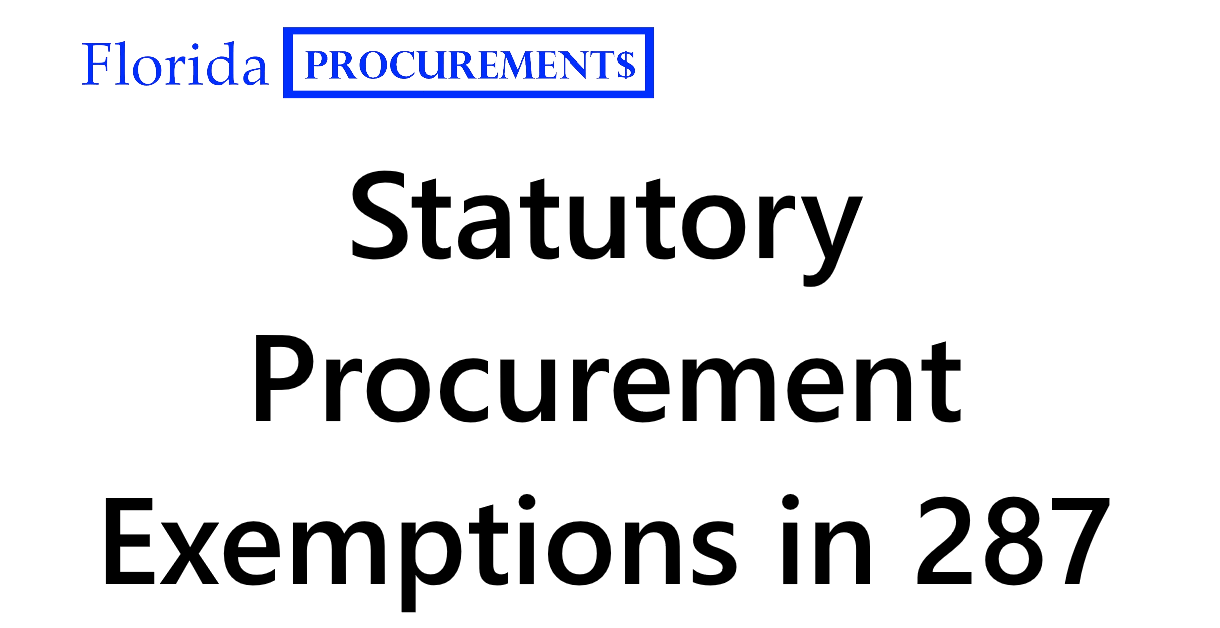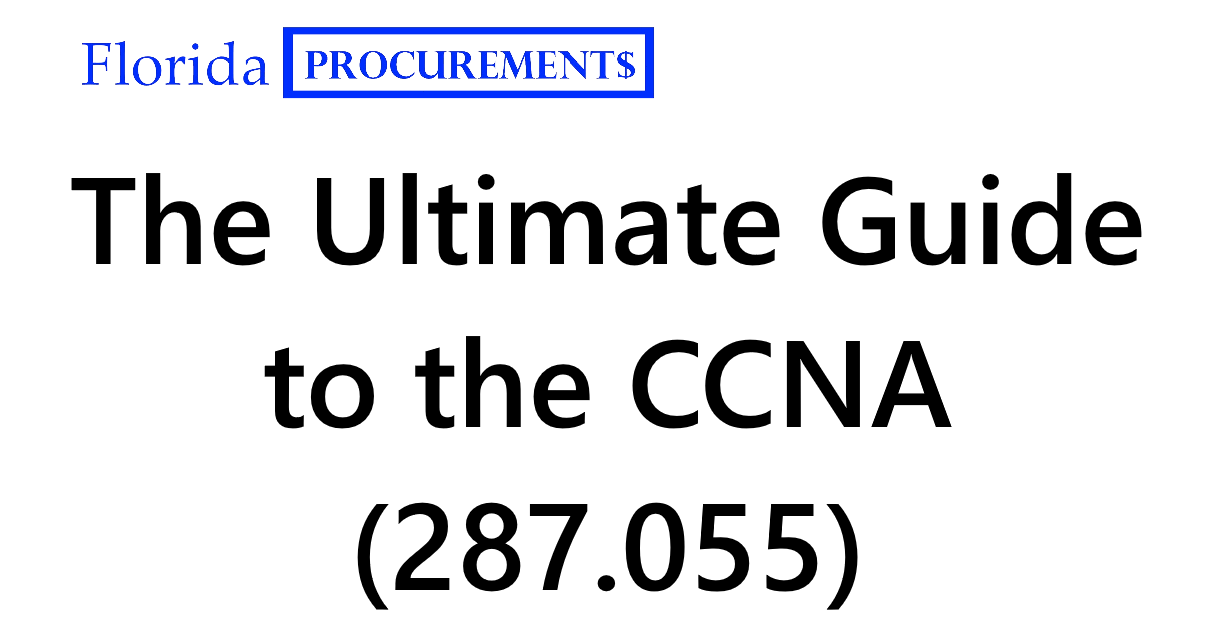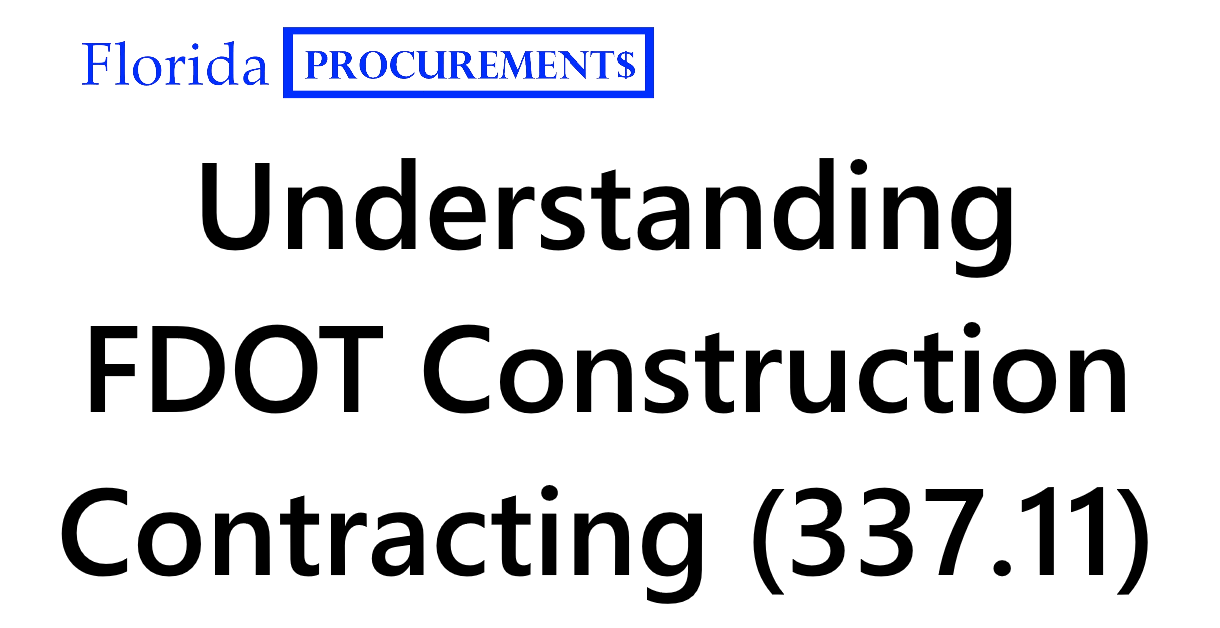
- May 20, 2025
- Sean Gellis
- 0
Welcome to FloridaProcurements.com (FlaProc), your authoritative resource for navigating Florida’s government contracting landscape, with particular focus on transportation and technology opportunities. FlaProc provides free, expert guidance to help companies identify and secure state contracting opportunities throughout Florida.
This resource is maintained by Attorney Sean Gellis of Gellis Law, PLLC, one of less than 75 attorneys Board Certified in State and Federal Government and Administrative Practice by The Florida Bar. Mr. Gellis brings unique insight to government contracting, having served as the Chief of Staff of the Florida Department of Management Services (DMS), General Counsel of the Florida Department of Transportation (FDOT), and Deputy General Counsel of the Florida Office of Insurance Regulation – positions that provided direct oversight of technology initiatives and issues of statewide importance. His record in bid protest litigation reflects the sophisticated advocacy and strategic thinking he brings to government contracting matters, particularly in complex transportation and technology procurements. Sean also leads Procurement Insider, a confidential subscription service that provides technology vendors with strategic intelligence and insider analysis of Florida government opportunities. Learn more about transforming your approach to government contracting at www.gellislaw.com/procurement-insider
The Complete Guide to Florida’s Statutory Competitive Solicitation Exemptions
As the former General Counsel of a Florida state agency, I’ve seen countless vendors struggle to understand when competitive solicitation is—and isn’t—required. Today, I’m breaking down one of the most overlooked aspects of Florida’s procurement landscape: the statutory exemptions found in section 287.057(3)(e), Florida Statutes.
What Are Competitive Solicitation Exemptions?
Before diving into specifics, let’s clarify what these exemptions actually mean. When a service or commodity falls under one of these exemptions, state agencies can purchase them directly, without the need for competitive bidding through ITBs, RFPs, or ITNs. This creates direct contracting opportunities for qualifying vendors, often with streamlined processes and faster timelines.
It’s important to note that these exemptions are distinct from other procurement alternatives like State Term Contracts, Alternate Contract Sources (ACS), or cooperative purchasing agreements. These are statutory carve-outs where the legislature has determined that traditional competition is either impractical or unnecessary.
The Statutory Exemptions: A Detailed Breakdown
Let’s examine each exemption in detail, exploring what services qualify, what limitations exist, and what opportunities they present for vendors.
1. Artistic Services
What Qualifies: Creative works, performances, and artistic productions.
Key Limitations: Does not include advertising or typesetting. The statute specifically defines “advertising” as representations made to promote commodities or services in connection with a trade, business, craft, or profession.
Real-World Examples:
- Commissioned artwork for public buildings
- Musical performances
- Theatrical productions
- Custom sculptures or installations
- Design of artistic elements for public spaces
Vendor Opportunities: Artists, performers, and creative professionals can market directly to agencies for projects requiring artistic expression. Cultural institutions and arts organizations should particularly note this exemption.
2. Academic Program Reviews (Under $50,000)
What Qualifies: Evaluations and assessments of academic programs.
Key Limitation: The fee must not exceed $50,000.
Real-World Examples:
- Curriculum evaluations
- Department or program assessments
- Academic standards reviews
- Accreditation preparation services
- Educational effectiveness evaluations
Vendor Opportunities: Educational consultants, former academic administrators, and specialized educational assessment firms can approach state colleges and universities directly for these services.
3. Lectures by Individuals
What Qualifies: Presentations, speeches, and instructional talks delivered by individuals.
Key Limitation: The exemption applies to individuals, not firms or organizations, suggesting a focus on the unique knowledge or perspective of a specific person.
Real-World Examples:
- Guest speakers at state events
- Subject matter expert presentations
- Training sessions by recognized authorities
- Keynote addresses at government conferences
- Educational lectures at state institutions
Vendor Opportunities: Subject matter experts, professional speakers, and thought leaders can directly offer their speaking services to state agencies without competitive processes.
4. Legal Services
What Qualifies: A broad range of legal and legally-adjacent services.
Specific Inclusions: Attorney services, paralegal services, expert witness services, appraisal services, and mediator services.
Real-World Examples:
- Outside counsel for specialized matters
- Legal research and document review
- Expert testimony for state cases
- Property appraisals for government acquisitions
- Mediation services for disputes involving the state
Vendor Opportunities: Law firms, solo practitioners, paralegals, expert witnesses, appraisers, and mediators can market directly to agency general counsel offices and state attorneys.
5. Health Services
What Qualifies: Medical and health-related services involving examination, diagnosis, treatment, prevention, consultation, or administration.
Specific Inclusions: Mental health services, substance abuse services, and administrative costs for providers if using standard payment methodologies.
Real-World Examples:
- Medical examinations for state employees
- Mental health counseling services
- Substance abuse treatment programs
- Preventive health screenings
- Medical consultations for agency-run health programs
Vendor Opportunities: Healthcare providers, mental health professionals, medical facilities, and health administrators can establish direct relationships with state agencies needing these services.
6. Services for Persons with Disabilities (By Qualifying Organizations)
What Qualifies: Services provided to individuals with mental or physical disabilities.
Provider Requirements: Must be provided by not-for-profit corporations with 501(c)(3) status or by organizations governed by OMB Circular A-122.
Additional Considerations: Agencies must still consider the provider’s ability, past performance, time requirements, and price.
Real-World Examples:
- Specialized care services for disabled individuals
- Accessibility consulting
- Adaptive equipment training
- Supportive living program management
- Job coaching for persons with disabilities
Vendor Opportunities: Qualified non-profit organizations serving people with disabilities can directly approach agencies like the Agency for Persons with Disabilities, Department of Elder Affairs, and other human service agencies.
7. Medicaid Services
What Qualifies: Services delivered to eligible Medicaid recipients.
Key Limitation: Only exempt unless directed otherwise by law.
Real-World Examples:
- Medicaid provider services
- Managed care organization services
- Medicaid transportation services
- Home and community-based waiver services
- Administrative services related to Medicaid delivery
Vendor Opportunities: Medicaid service providers can contract directly with the Agency for Health Care Administration and other agencies involved in Medicaid service delivery.
8. Family Placement Services
What Qualifies: Services related to placing children or adults with families.
Real-World Examples:
- Foster care placement services
- Adoption services
- Kinship care arrangements
- Home studies for potential placements
- Post-placement supervision services
Vendor Opportunities: Organizations specializing in family placement can work directly with the Department of Children and Families and community-based care organizations.
9. Prevention Services (By Non-Profits)
What Qualifies: Mental health prevention services, including drug abuse prevention programs, child abuse prevention programs, and runaway shelters.
Provider Requirements: Must be operated by not-for-profit corporations.
Additional Considerations: Agencies must still consider ability, past performance, time requirements, and price.
Real-World Examples:
- Substance abuse prevention programs
- Child abuse prevention initiatives
- Youth runaway intervention services
- Mental health education and prevention
- Early intervention services for at-risk populations
Vendor Opportunities: Non-profit organizations providing prevention services can develop direct relationships with the Department of Children and Families, Department of Juvenile Justice, and Department of Health.
10. Workers’ Compensation Training and Education
What Qualifies: Training and education services provided to injured employees under Florida’s workers’ compensation law.
Statutory Reference: Section 440.491(6), Florida Statutes
Real-World Examples:
- Vocational rehabilitation services
- Retraining programs for injured workers
- Educational services for workforce reentry
- Job search skills training
- Accommodations training
Vendor Opportunities: Vocational rehabilitation providers, educational institutions, and specialized training firms can work directly with the Division of Workers’ Compensation.
11. DOT Contracts Under Section 337.11
What Qualifies: Contracts entered into under Section 337.11, Florida Statutes, which generally relates to Department of Transportation (DOT) contracts for road, bridge, and other transportation infrastructure.
Real-World Examples:
- Road construction contracts
- Bridge design services
- Transportation infrastructure maintenance
- Highway safety improvements
- Traffic engineering services
Vendor Opportunities: This is essentially a reference to FDOT’s separate procurement authority under Chapter 337. Transportation contractors should familiarize themselves with FDOT’s specific contracting processes.
12. Services or Commodities from Governmental Entities
What Qualifies: Any services or commodities provided by federal, state, or local governmental entities.
Real-World Examples:
- Interagency agreements for shared services
- Local government providing services to state agencies
- Federal government providing technical assistance
- University system providing research services
- Water management districts providing environmental services
Vendor Opportunities: While not applicable to private vendors, public entities should be aware they can offer their services directly to state agencies without competitive processes.
13. Statewide Public Service Announcements
What Qualifies: PSA programs provided by Florida statewide nonprofit corporations with 501(c)(6) status.
Key Requirement: Must have a guaranteed documented match of at least $3 to $1.
Real-World Examples:
- Public awareness campaigns
- Educational media programs
- Public health messaging
- Safety information campaigns
- Environmental protection announcements
Vendor Opportunities: Qualifying business leagues, chambers of commerce, and trade associations that can meet the matching requirement can directly offer PSA services to state agencies.
How to Leverage These Exemptions as a Vendor
If your business provides services that fall under one of these exemptions, here’s how to approach contracting opportunities with Florida agencies:
1. Verify Your Exemption Status
Before approaching an agency, thoroughly assess whether your services genuinely fall within an exemption. Many exemptions have specific requirements or limitations that might affect your eligibility.
2. Research Agency Needs
Identify which state agencies require your exempt services. Review agency websites, budgets, and strategic plans to understand their needs and priorities.
3. Prepare Clear Documentation
Develop materials that clearly explain how your services qualify under the relevant exemption. This documentation helps agency procurement officers justify direct contracting.
4. Build Agency Relationships
Unlike competitive solicitations where contact may be restricted, exempt services allow for more direct relationship building. Identify the appropriate decision-makers and introduce your services.
5. Understand Agency-Specific Processes
Even with exemptions, agencies often have internal procedures for procuring exempt services. Some may require justification forms, multiple quotes, or other documentation.
6. Be Prepared to Demonstrate Value
While competitive bidding isn’t required, agencies still have a responsibility to ensure they’re receiving fair value. Be prepared to discuss pricing, qualifications, and past performance.
Common Misconceptions and Pitfalls
Misconception #1: “Exemptions Mean No Rules”
While competitive solicitation isn’t required, other procurement regulations still apply. Contracts must comply with budget authority, reporting requirements, and other statutory provisions.
Misconception #2: “Any Service Can Be Made to Fit an Exemption”
Agencies and their legal counsel interpret these exemptions strictly. Attempting to force non-exempt services into exemption categories can lead to procurement challenges and contract invalidation.
Misconception #3: “Exemptions Apply to All Government Entities”
These exemptions specifically apply to state agencies governed by Chapter 287. Local governments may have different procurement exemptions under their own ordinances.
Misconception #4: “No Documentation Required”
Even when using an exemption, agencies typically must document the justification for direct contracting and maintain appropriate records.
The Bottom Line: Strategic Opportunities for Vendors
Understanding these statutory exemptions can open direct contracting pathways for qualifying vendors. While they may not cover every service category (particularly in technology, where few exemptions apply), they represent significant opportunities in specialized fields like healthcare, legal services, creative works, and human services.
For vendors in these exempt categories, the key is presenting your services with a clear understanding of how they align with statutory exemptions, while still demonstrating competitive value and quality. When approached correctly, these exemptions can lead to streamlined contracting opportunities and long-term agency relationships.
Remember: even when competitive solicitation isn’t required, competition still exists. Agencies have discretion in choosing exempt service providers, and they’ll typically select vendors who demonstrate expertise, reliability, and value.
Need specific guidance on navigating Florida’s procurement landscape? Contact us at FloridaProcurements.com for personalized consulting on your government contracting strategy.






